
Archived Posts
- August 2024 (1)
- February 2024 (2)
- December 2023 (2)
- November 2023 (1)
- October 2023 (1)
- July 2023 (2)
- April 2023 (2)
- August 2022 (2)
- July 2022 (1)
- June 2022 (1)
- May 2022 (1)
- March 2022 (2)
- December 2021 (2)
- November 2021 (2)
- October 2021 (1)
- September 2021 (1)
- August 2021 (2)
- May 2021 (1)
- December 2020 (1)
- November 2020 (1)
- August 2020 (1)
- July 2020 (3)
- June 2020 (1)
- April 2020 (3)
- March 2020 (3)
- February 2020 (2)
- November 2019 (1)
- September 2019 (1)
- April 2019 (1)
- February 2019 (1)
- December 2018 (1)
- October 2018 (1)
- August 2018 (2)
- April 2018 (1)
- March 2018 (2)
- February 2018 (4)
- December 2017 (1)
- April 2017 (1)
- February 2017 (2)
- December 2016 (1)
- October 2016 (2)
- September 2016 (1)
- August 2016 (1)
- July 2016 (1)
- June 2016 (2)
- April 2016 (3)
- March 2016 (6)
- February 2016 (1)
- January 2016 (2)
- December 2015 (3)
- October 2015 (2)
- September 2015 (14)
- June 2015 (5)
- May 2015 (3)
- April 2015 (6)
- March 2015 (4)
- February 2015 (6)
- January 2015 (2)
- December 2014 (6)
- November 2014 (3)
- October 2014 (11)
- September 2014 (5)
- August 2014 (2)
- July 2014 (6)
- June 2014 (3)
- May 2014 (4)
- April 2014 (4)
- March 2014 (7)
- February 2014 (3)
- January 2014 (4)
- December 2013 (6)
- November 2013 (2)
- October 2013 (9)
- September 2013 (5)
- August 2013 (5)
- July 2013 (4)
- June 2013 (6)
- May 2013 (2)
- April 2013 (3)
- March 2013 (3)
- February 2013 (5)
- January 2013 (5)
- December 2012 (6)
- September 2012 (1)
- August 2012 (1)
- July 2012 (2)
- June 2012 (2)
- May 2012 (5)
- April 2012 (3)
- March 2012 (6)
- February 2012 (4)
- January 2012 (1)
- November 2011 (1)
- September 2011 (2)
- July 2011 (2)
- June 2011 (2)
- May 2011 (2)
Though Behind on SDGs, they are the Best We’ve Got
One just needs to read the daily news to be worried – conflicts spreading, hunger not in check, climate changing. Tragically, for millions of people around the world, these are just not headlines but a living reality; a hellish reality to be frank with lives and livelihoods devastated in apocalyptic ways. Against such a backdrop, one can’t be complacent about the state of the world. So, it comes as no surprise that at the recent High-level Political Forum on Sustainable Development (HLPF), the news was bad:
Only 17% of the Sustainable Development Goals (SDGs) targets are on track.
However, one positive note from the discussions was that everyone agreed that agenda 2030 and the Sustainable Development Goals was the best path available for sustainable development. All 17 SDGs might be imperfect, but they are the only agreed, globally developed goals we have got, so it is time to “double down”.
This is part of the clarion call contained in the Ministerial Declaration of the HLPF that took place from 8 to 17 July at the UN Headquarters in New York. HLPF 2024 identified priorities needed to accelerate progress. Some of these priorities include reforming the international financial architecture; bridging the digital divide; tackling runaway hunger and malnutrition that saw 733 million people go hungry in 2023; promoting gender equality; and addressing multidimensional poverty that currently afflicts about 1.1 billion people.
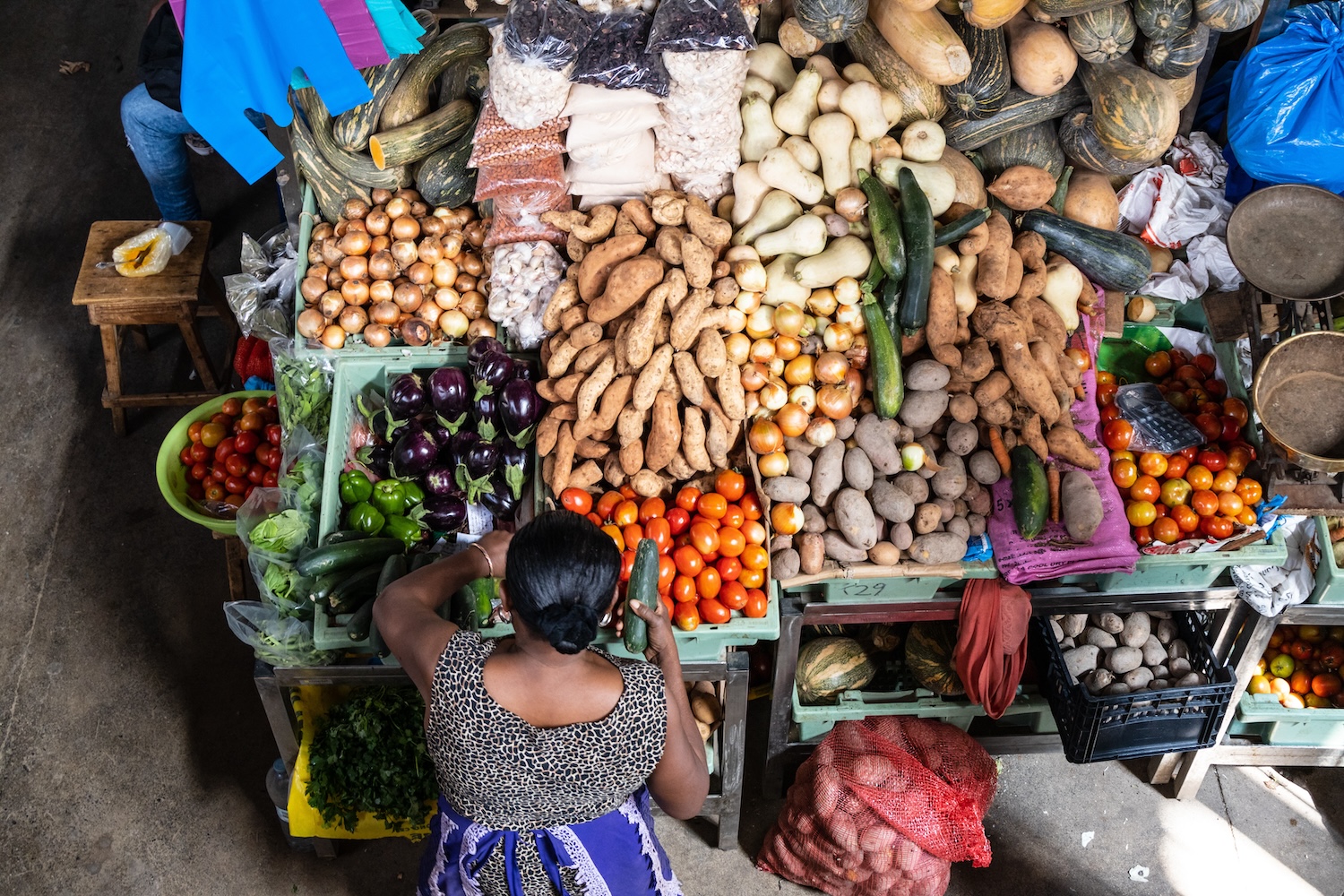 On SDG 2 in particular, the HLPF recognized the importance of ending hunger, achieving food security and improving nutrition, and promoting sustainable agriculture. It committed to:
On SDG 2 in particular, the HLPF recognized the importance of ending hunger, achieving food security and improving nutrition, and promoting sustainable agriculture. It committed to:
- reduce food insecurity and rural poverty by promoting more efficient, inclusive, resilient and sustainable agri-food systems;
- promote resilient markets;
- increase agricultural productivity, efficiency and resilience;
- promote conservation and sustainable management of biodiversity;
- facilitate transitions into non-agricultural employment;
- promote inclusive climate action;
- improve rural livelihoods;
- and strengthen rural development and take actions to better address the needs of rural communities.
With focus now shifting to the upcoming Summit of the Future in September, the world will have another high-level political and policy moment to continue reinvigorating the 2030 Agenda. As noted by the HLPF, the Summit should not create a new set of goals but instead concentrate on driving agreement on the much needed and long called-for structural reforms of global institutions to further consolidate progress towards the SDGs and rebuild trust with global citizens.
As we head into the final leg of the SDGs, the world has a clear must-do list including at the Summit of the Future. The enormity of the task beyond 2030 after the SDGs is even more daunting. The future UN Secretary General will have a full in-tray. SHE will need to think about ways to build collaboration more effectively and avoid the binary calls to action that frame current discussions too much.

If we are to progress together, we need all regions and all actors bringing their strengths to the table. The world has agreed that we know the Goals. The how to get there is where the work is needed to 2030 but also past it.
Insights from the Sustainable Consumption and Production Meeting at UNEA6
It was my pleasure to join the Sustainable Consumption and Production (SCP) meeting hosted by OnePlanet at UNEA6 and discuss the importance of enabling all parts of the food system value chain.
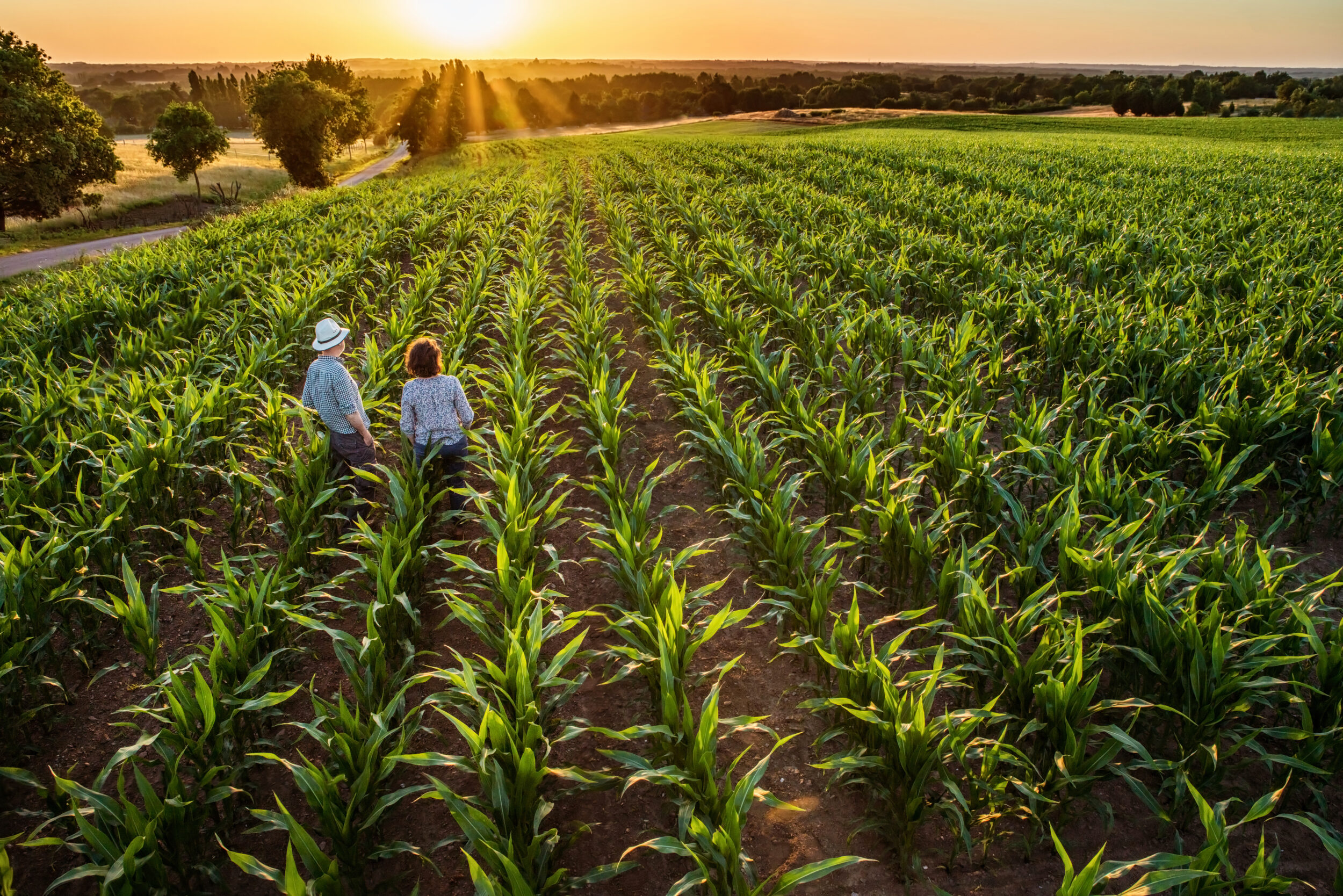
The food system consists of businesses small and large – from a fisher, to the food stall in a city, to global multinationals. Together they comprise the delivery mechanism of our entire food system. Each part of that food system has a vital role to play in ecosystem services, soil health, and our oceans. Investment in the food system is frequently limited by inequalities where actors least able to bear costs are often on the front line of climate challenges. SCP interventions are highly cost effective because they create long term solutions that are beneficial. Investments addressing the inequalities are a compelling way to advance SCP. Food loss and waste is an excellent example.
Fellow panelist Monica Yater did an excellent job of describing the role pastoralists play in the agriculture system. Later, the conversation turned to a favorite topic – soils! James Lomax and I were able to speak to the importance of soil health and I used the example of no-till which has been used on the Canadian prairies for 25 years or more.
Sowing Resilience: Soil Health’s Crucial Role in Africa’s Triple Planetary Crisis
Agriculture, which relies heavily on soil health, is the backbone of global food systems. Around 95% of our food comes from the soil. It’s not just about quantity; the quality of soil directly influences the nutritional content of crops. In a world striving to eradicate hunger, understanding and preserving soil health are paramount. Soils are a powerful ally in the fight against climate change. They act as a carbon sink, storing more carbon than all of the Earth’s vegetation combined.
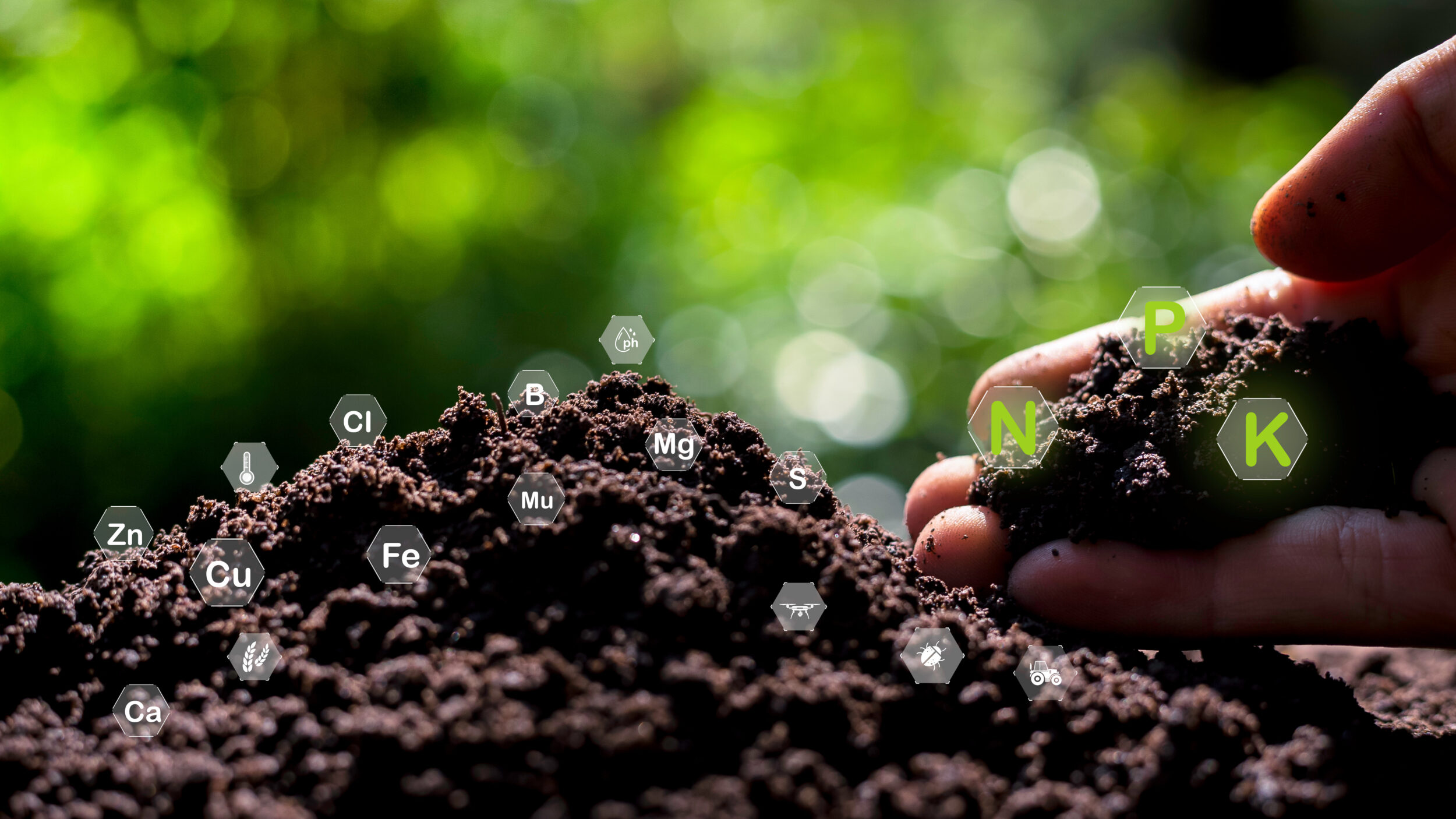
Africa, with its diverse climates and landscapes, is particularly dependent on sustainable farming practices that are resilient in the face of the planetary crises of biodiversity loss, climate change and pollution. The majority of African farmers rely on rain-fed agriculture, making them vulnerable to the impacts of climate change. Soil degradation poses a significant threat to food security, making the recognition of the importance of soil health in Africa paramount for building resilience in the face of the triple planetary crisis.
The Sixth session of the United Nations Environment Assembly (UNEA-6) (unep.org) provides a global platform to address pressing environmental challenges and leveraging multilateralism to tackle the triple planetary crisis of climate change, nature and biodiversity loss, pollution and waste.
I am honored to moderate the side event at UNEA-6 titled “Cultivating Soil Health: Africa’s Pillar of Resilience in the Triple Planetary Crisis”. The side event will revolve around key themes crucial for nurturing soil health and promoting sustainable agriculture in Africa. We will explore the significance of soil health in achieving climate resilience, food security, and biodiversity conservation. Innovative farming practices from different actors will take center stage, emphasizing their role in addressing the triple planetary crisis. Discussions on policy frameworks, incentives, and international collaboration will also be there, recognizing Africa’s unique challenges and opportunities in sustainable agriculture.
I am thrilled to be joined by his excellency Mr. Abderrazzak Laassel, Ambassador and Permanent Representative, Embassy of the Kingdom of Morocco, in Kenya, as well as representatives of the United Nations Environment Programme (UNEP), the World Business Council for Sustainable Development (WBCSD), OCP and Kenya Agricultural and Livestock Research Organization (KALRO).
If you are attending UNEA-6, I invite you to join us on the Tuesday 27th of February 2024, from 1:30 to 2:45 pm EAT at Conference Room 1 for this side event.
2023 Year End Highlights
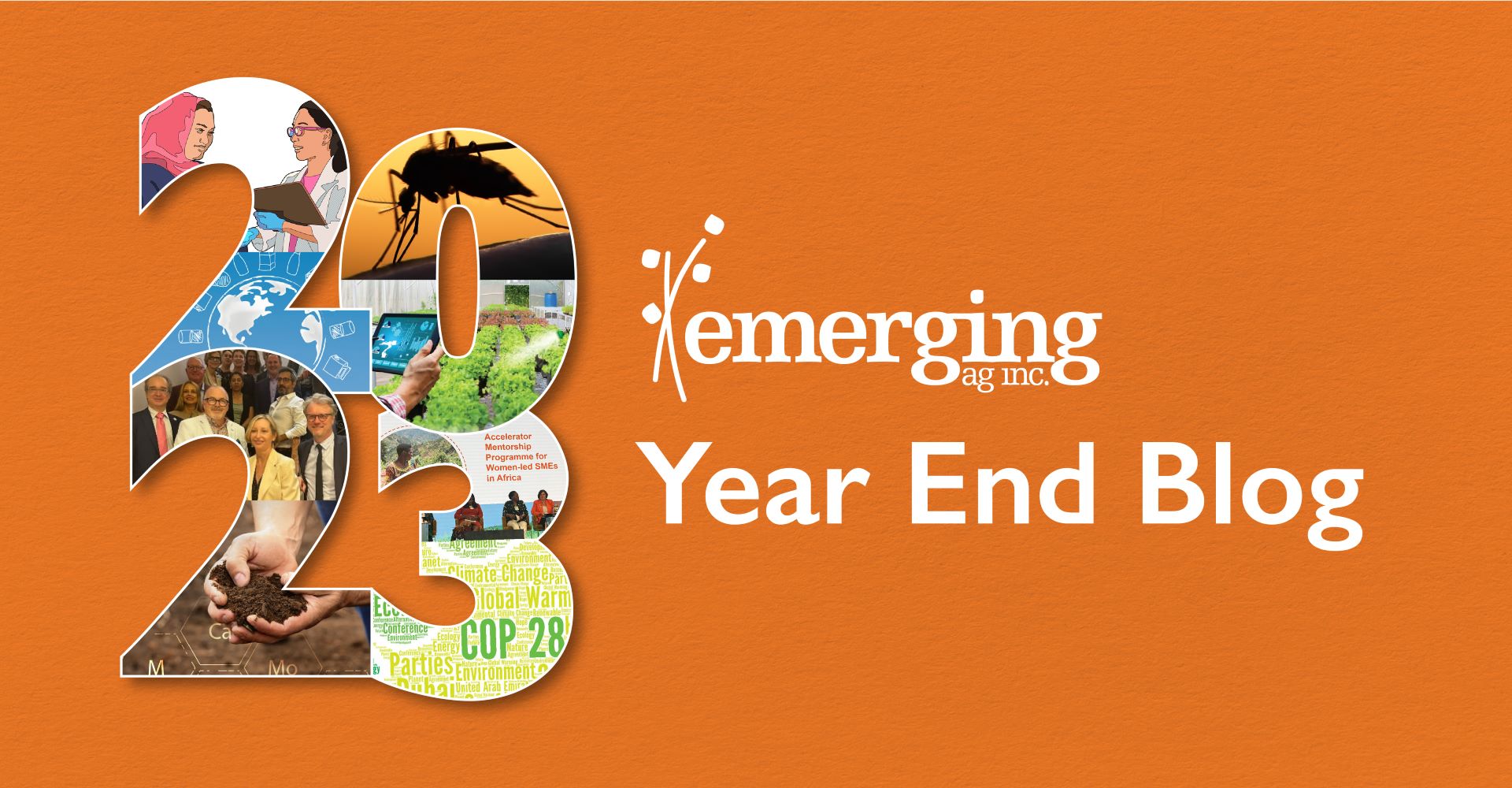
January
FAO-IAFN Women SME Accelerator Mentorship Programme
Women agripreneurs from Africa are being supported by fellow leaders around the world through the Food and Agriculture Organization of the United Nations (FAO) and the International Agri-Food Network (IAFN) jointly piloted the Women SME Accelerator Mentorship Programme to support women entrepreneurs in addressing key challenges and constraints they face in their businesses.
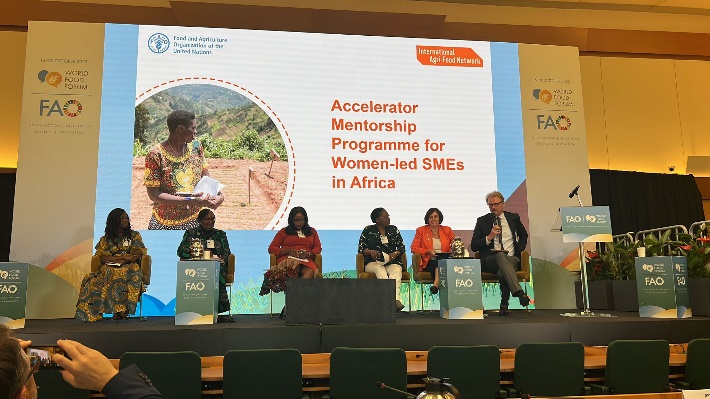
The programme resulted in 46 women entrepreneurs advancing their business with thanks to the learnings from their mentors and engagement in the workshops. Some are in negotiations for new finance, many created new jobs, and several created new food products for Africa. You can learn a first-hand success story from the programme here.
The success of the pilot resulted in the development of a second year of the programme. The new cohort was announced during the 2023 Science in Innovation Forum at the World Food Forum in October. It includes one-on-one mentoring, e-learning courses by FAO and workshops highlighting business development and marketing, human resource management, and finance. Emerging arranges the mentorship pairings and coordinates the program as secretariat to IAFN. Learn more about the launch, or watch the event recording, here.
February
Guiding Principles for Data Ownership, Use and Privacy

To address data protection and ownership, the Digital Agriculture Association (DAA), of which Emerging acts as the Secretariat, developed a position paper entitled “Data Ownership, Use, and Privacy Guiding Principles” proposing a series of recommendations on who owns the land data and how it could be shared.
The paper addresses the difference between ‘personal information” (data relating to identifiable persons applicable to Privacy Law) and ‘agricultural data’ (data related to agricultural production) and breaks down seven recommendations into categories of control, transparency, and fairness. With this paper, Board Members and members of the Secretariat were able to engage in a series of discussions in the ThinkTwenty (T20), the official engagement group of the G20. The main ideas of the paper were well received in high-level discussions with many of the points being taken into the T20 policy paper and reflected at the G20.
March
Empowering Women at the UN Commission on the Status of Women (CSW67)
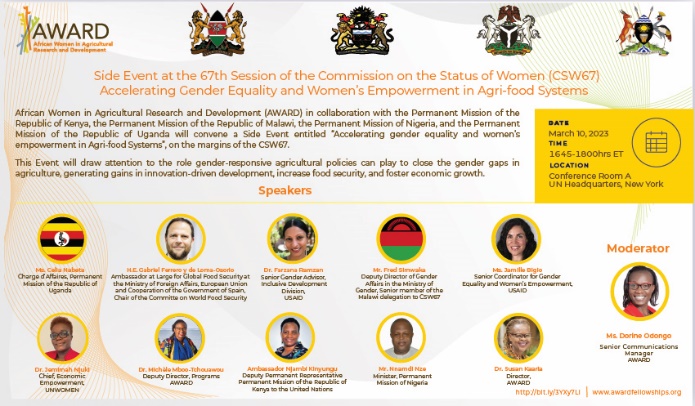
A focus on women in agri-food systems was brought to Commission on the Status of Women (CSW67). African Women in Agricultural Research and Development (AWARD) hosted a standing-room only side event on March 10th at UN headquarters. The event was co-sponsored by thePermanent Missions of Kenya, Malawi, Nigeria and Uganda to the United Nations. Discussions highlighted some of the emerging trends in agricultural policies, and the policy options for implementing an equitable food system.
Additionally, the CGIAR GENDER Impact Platform, a Special Breakfast meeting on March 9th titled “Agricultural Innovations for Rural Women for Resilient Food Systems.” Featuring gender-responsive agricultural innovations with a focus on case studies across Africa and Asia, it illustrated the need for investments in gender responsive agricultural technologies.
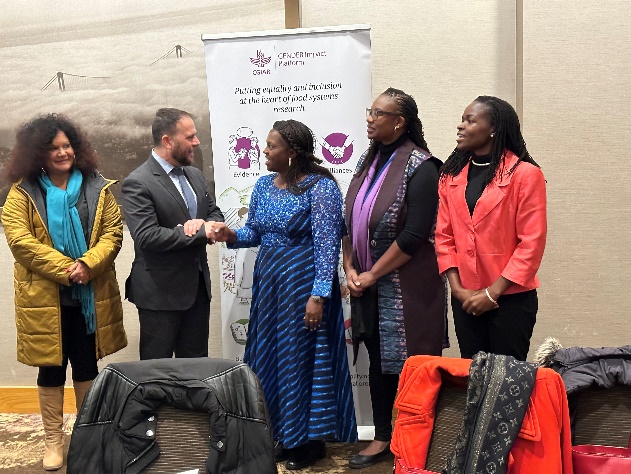
A highlight of the event was the participation of Pastor Dorcas Rigathi, Second Lady of Kenya who was accompanied by Ambassador Njambi Kinyungu, Deputy Permanent Representative of Kenya to the United Nations. Pastor Rigathi gave inspiring remarks regarding her own experience and stressed the importance of gender equality in the food and ag sector. She further noted the need to lift barriers to access to credit and land ownership.
Additional high-level participants included Ms. Lauren Phillips, Deputy Director, Inclusive Rural Transformation and Gender Equality Division at FAO, Mr. Moritz Meier-Ewert, UNCTAD, Paul Skoczylas, WFP, Ms Sharon Brennan Haylock, ACABQ and several members of Senator McCarthy’s delegation, including representatives from the Permanent Missions of Australia, Bahamas and Saint Lucia. It was a pleasure to support both organizations to get women in agriculture on the agenda.
April
Driving Change for World Malaria Day 2023

Marked each year on April 25, World Malaria Day brings together the global malaria community to celebrate the milestones achieved in the fight against malaria and consider the challenges still ahead. This year’s theme “Time to Deliver Zero Malaria: Invest, Innovate, Implement” drew attention to the pressing need to deliver bold investments in malaria control and elimination, to innovate to deliver transformative and improved solutions, and to implement the lifesaving tools and strategies available today to reach those who need them the most.
Emerging worked with Target Malaria – an international not-for-profit research consortium aiming to develop new genetic technologies to reduce malaria transmission – to design a digital wax motif which served as the visual identity for the consortium’s social media campaign celebrating the occasion. Inspired by traditional wax print textiles, the pattern was designed to feature a variety of elements representing the project’s work to fight malaria. The final design was used to create branded content including banners, vignettes and videos for use across social media. The social media posts which included the visuals developed by Emerging were part of the top 3 performing posts of Target Malaria’s campaign on X and LinkedIn. Overall, Target Malaria’s World Malaria Day campaign was very successful with engagement received from across the global malaria community. The campaign received more than 20k impressions on X and more than 10k impressions on LinkedIn.
You can follow Target Malaria on X, YouTube and LinkedIn to learn more about the project and its inspiring work.
May
Partnering 4 Betters
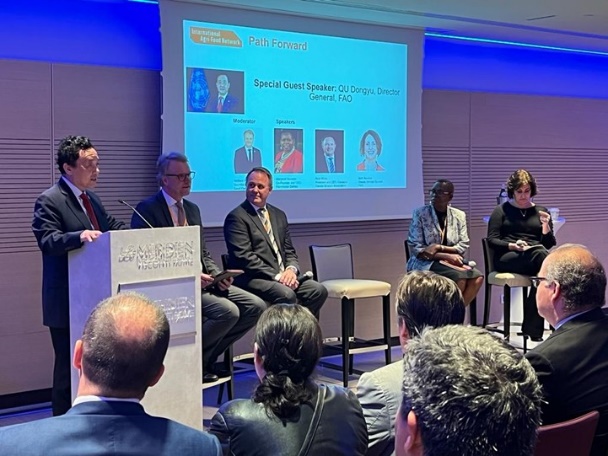
The FAO Strategic Framework 2022-31 has created the ‘Four Betters’; better production, better nutrition, better environment, and better life, leaving no one behind, to guide the work of the organization towards the SDGs. To further private sector support for this agenda and the FAO Strategic Framework, the International Agri-Food Network (IAFN) members convened an event on May 3, 2023, titled Partnering 4 Betters with over 100 enthusiastic guests among which included Ambassadors and other senior representatives of Member States, UN agencies and the Private Sector. Special Guest Speakers at the event were Director-General of FAO, Dr QU Dongyu, Deputy Director-Generals of FAO, Beth Bechdol and Maria Helena Semedo and FAO Chief Economist Maximo Torero Cullen.
Partnering 4 Betters was held as a full one-day event allowing for active engagement of the Private Sector with Member States and representatives from the Rome Based Agencies. Plenaries were held on science and innovation and on climate. Three workshops per theme allowed for deeper discussions and the exploration of ideas and initiatives, focused on furthering FAO’s efforts in key areas. An investment café at lunch was held in preparation for FAO’s Investment Forum. Learn more about the event here.
Sowing the Power of Soil Health
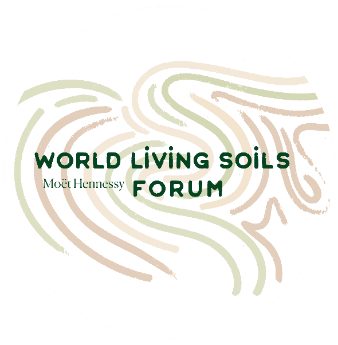
On May 22, 2023, Moët Hennessy marked the one-year anniversary of the World Living Soils Forum with a high-level dinner to continue advancing the soil health agenda with the support of Emerging. The event, held on the International Day for Biological Diversity, aimed to raise awareness about the critical role of soils. Attended by approximately 40 distinguished guests, including ambassadors from FAO Member States, UN agency personnel, and senior private sector representatives, the dinner featured a unique “wine/soil issue pairing” experience, emphasizing the connection between Moët Hennessy’s products and the specificities of the soils they originate from, and highlighted Moët Hennessy’s commitment to preserving soil health through their Maisons’ initiatives. Emerging crafted the events program, resulting in facilitated discussions and furthered multistakeholder action.
June
Nurturing Sustainability in Dairy Farming on World Milk Day
The 2023 World Milk Day showed how dairy is reducing its environmental footprint, while simultaneously providing nutritious food and sustainable livelihoods. Together, the industry united in a dynamic narrative that encompasses the environmental, nutritional, and societal aspects of the sector. For the 6th year in a row, Emerging developed and managed the global campaign through outreach, social media engagement, and monitoring of activities. Farmers shared videos showcasing innovation and technology being used to pave the way for a brighter and more sustainable future. The 2023 campaign continued to see massive results, exceeding 1.35 billion impressions, 709 million people reached and over 324,000 bring posts highlighting the dairy sector. Read the full report here.
Improving African Soil Health
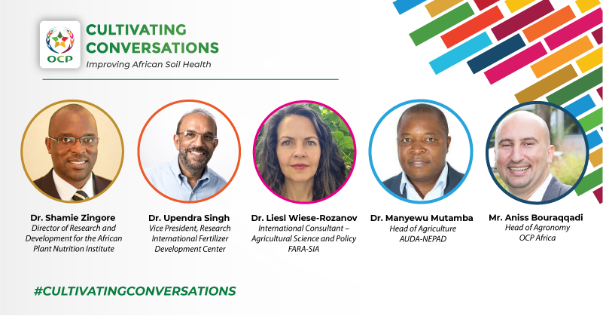
The 2023 Cultivating Conversations series saw 2 events take place in 2022 entitled “Improving African Soil Health” and “Food For Thought: New Global Learnings”. The first, Improving African Soil Health, discussed the necessity of improving African soil health so as to ensure food security on the continent. The continent needs to ensure healthy soils, which includes actions such as OCP’s mobile soil testing labs, capacity building, investment in mapping soils, and soil stewardship activities. This supported ongoing efforts to advance soil health ahead of the Climate COP and preparations for discussions at the African Union.
July
Promoting Oat Nutrition in Japan
As part of our work on promoting nutrition and the health benefits of oats, Emerging, on behalf of the Prairie Oat Growers Association, continues to manage a social media campaign titled “Kanadanootsumugi”. The campaign targets Japanese consumers and includes engagement with local chefs and bloggers to develop and promote oat-based recipes showcasing the diverse use case of oats in Japanese cuisine. The 2023 campaign saw great success, reaching over 550,000 Japanese consumers each month. The growing audience has enabled the campaign to expand to new platforms, such as YouTube and Instagram. The campaign includes a recipe library on the Kanadanootsumugi website, YouTube channel, Facebook page and Instagram account.
Insights from the IAFN and PSM Annual General Meetings

The International Agri-Food Network (IAFN) and Private Sector Mechanism (PSM) held their respective annual general meetings on the 6th and 7th of July. As Secretariat of the Network, Emerging held the meetings using a hybrid method, with the in-person portion taking place in Rome. The IAFN AGM included discussions on Governance Matters, the review of Bylaws, Workstream updates, the FAO Private Sector Engagement in Governing Bodies, a presentation on Regenerative and the proposed 2024 workplan and budget. The IAFN AGM resulted in a bilateral meeting between the New Zealand Counsellor and representative to FAO and IAFN members of the Coalition for an Enhanced Codex, as well as a meeting with the Codex Secretariat.
Learn more about the AGMs here.
UN FSS+2 Stocktaking Moment
The first UN Food Systems Summit Stocktaking Moment was held July 25-26, entitled FSS+2 Stocktaking Moment. The event was held at FAO Headquarters in Rome and co-hosted by the Government of Italy, in collaboration with the Rome Based Agencies, the UN Food Systems Coordination Hub and the wider UN system. This Stocktaking Moment helped build on the momentum created by the 2021 Food Systems Summit, allowing for the review of progress on key commitments from the summit. Throughout the three days of discussions, a number of Speakers noted the contributions of the Private Sector in food systems transformation as well as the need for inclusive approaches and partnerships towards food system transformation and in this regard the important role of the Private Sector. Learn more about the work being done to address these discussions here.
The Private Sector Mechanism (PSM), of which Emerging is the Secretariat, was represented by a 30+ member delegation who participated in all sessions. Additionally, PSM members were invited to speak at a number of sessions including the following:
- Special Event – “Fertilizers, Meeting Short-term Needs While Working Towards Sustainable Solutions” – Alzbeta Klein, Director General, IFA
- Leadership Dialogue – “Stakeholder Roundtable – Rocco Renaldi, Secretary General, IFBA
- Leadership Dialogue “Food Systems for the Planet” – Eija Hietavuo, Vice President, Corporate Affairs, Tetra Pak
- Special Event “Presenting the Food Systems Window of the Joint SDG Fund” – Michael Keller, Secretary General, International Seed Federation
- Closing Plenary, Michael Keller, Chair of Private Sector Mechanism of CFS
Additionally, PSM, in collaboration with WBCSD, AGRA and the Zero Hunger Pledge convened a Side Event on July 26 entitled “Private Sector Ambition, Action and Accountability towards Food Systems Transformation: Where are we now and where do we need to go next”, where speakers reviewed progress on the implementation of Private Sector commitments and discussed additional options for effectively mobilising the Private Sector towards impactful action for a regenerative and equitable food system that provides healthy, safe and nutritious food for all.
August
Celebrating Innovative Solutions on World Mosquito Day
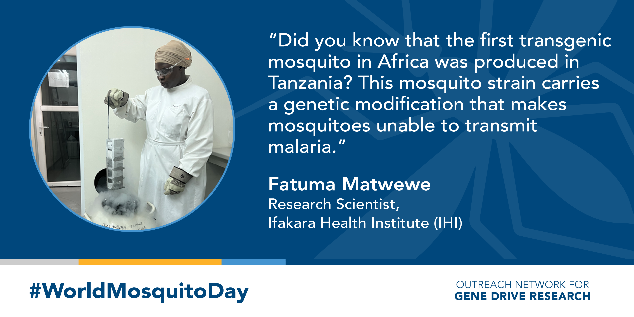
For the past 126 years, World Mosquito Day has been celebrated globally on August 20 to spotlight ongoing efforts in the fight against the world’s deadliest creature. The day is a global commemoration of Sir Ronald Ross’ groundbreaking discovery in 1897 that female Anopheles mosquitoes are responsible for the transmission of the malaria parasite.
In celebration, the Outreach Network for Gene Drive Research showcased the profiles of 13 early-career researchers who are working on innovative approaches to tackle mosquito-borne diseases at the source. Their work spans across different countries and focus areas, from conducting studies to understand the behavior and ecological interactions of mosquitoes, to developing new genetic vector control tools which could complement current approaches to fight mosquito-borne diseases, such as malaria and dengue.
Emerging also worked with not-for-profit research consortium Target Malaria, to develop a series of videos showcasing different aspects of the organization’s work to develop new tools to fight malaria. These were showcased across social media as part of the organization’s campaign for World Mosquito Day, coined the #MosquitoCountdown. The campaign received an overwhelmingly positive engagement: it generated just under 30k impressions across X and 14k impressions on LinkedIn.
September
Transforming African Food Systems – AGRF 2023

The Africa Food Systems Forum 2023 Summit (#AGRF2023) held in Dar Es Salaam, Tanzania on September 5-8, 2023, brought together more than 5400 delegates from 90 countries – including 5 Heads of State and Government, 30 Ministers, 6 former Heads of State and Government, more than 80 heads of international agencies and businesses. CEOs of global, regional, and national companies, combining to create a private sector delegation of 1200, including SMEs. The Summit called for action in the food systems reenergizing political will and advancing investment efforts towards sustainable agricultural transformation.
Emerging worked on the program, content, and speaker management for the conference. Resulting in over 500 speakers (exceeding the target of 400), 56 partner and sponsor sessions, over 70 partner events, 10 plenary sessions and 28 parallel sessions beyond the 25 parallel agri-business and dealroom sessions. There were over 35 ministers in attendance and of the 5400 delegates, over 57% of participants were women. The African continent is not just transforming its food systems; it is sowing the seeds of change, nurturing innovation in the fertile soil of tradition, and harvesting hope for a brighter future. This journey towards transforming the African food systems is a remarkable testament to the resilience and ingenuity of the continent.
PAMCA’s 9th Annual Conference & Exhibition
The Pan-African Mosquito Control Association’s (PAMCA) 9th Annual Conference & Exhibition convened vector control professionals worldwide in Addis Ababa, Ethiopia. The event showcased diverse research, including studies on new tools such as gene drives to fight the malaria-vector mosquito, Anopheles gambiae. Notably, the conference featured the 2023 Policy Engagement Workshop, jointly organized by PAMCA and the Outreach Network for Gene Drive Research, which Emerging acts as the Secretariat. Emerging worked to develop a training, held alongside the conference, aimed to elevate awareness among young scientists from various African research institutions about the importance of active participation in international policy dialogues. It provided valuable tools to effectively communicate their research and practice their engagement skills over two days.
The Workshop sessions extended over two days and combined theory and practice. The theory part helped participants gain a better understanding of the importance of engaging in policy debates, learn more about relevant international fora for scientists in the vector control field, as well as explore how to make the best of engagement opportunities. Through a series of practical exercises and roleplays, they were also invited to practice presentation skills and their ability to explain research work effectively to different audiences. Learn more about the workshop here.
October
Highlighting Resilient and Inclusive Food Systems at the 51st Committee on World Food Security (CFS)
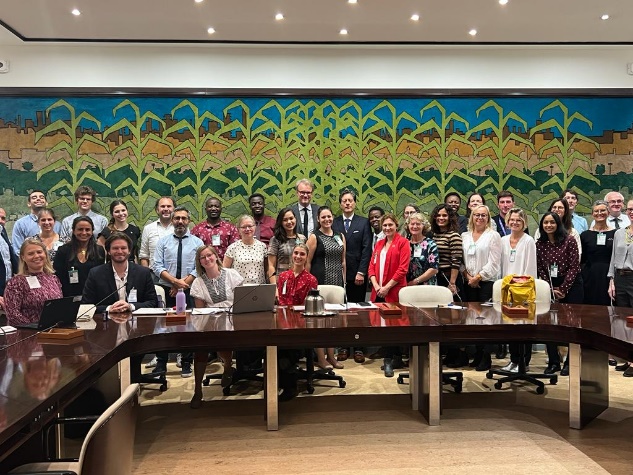
The Private Sector Mechanism (PSM) had an active participation at the 51st Committee on World Food Security (CFS) with a delegation of 127 business leaders from 30 countries. Of this delegation, 52% were women who engaged in plenary, several side events and networking sessions. Additionally, PSM held 13 bilateral meetings with key officials and stakeholders which highlighted the private sector’s commitments, priorities, and support for CFS’s Multi-Year Program of Work (MYPoW). In Plenary, PSM was able to make 13 interventions. Additionally, PSM members organized 4 side events this year reaching over 470 attendees in person and virtually. Members of the delegation also had an opportunity to speak in additional side events and a special event session in plenary. Learn more about the Private Sector engagement at CFS5, including a review of PSM-hosted side events, here.
The High-Level Dinner on Resilient and Inclusive Food Systems, hosted by PSM, brought together 160 guests for a fruitful exchange of ideas and discussions on initiatives, involving professionals and dignitaries in this crucial and timely domain. Held under the theme “Diversity is the key to achieving resilience”, the event provided a forum for discussions that can contribute to the upcoming CFS Inequalities Workstream to take place January 2024.
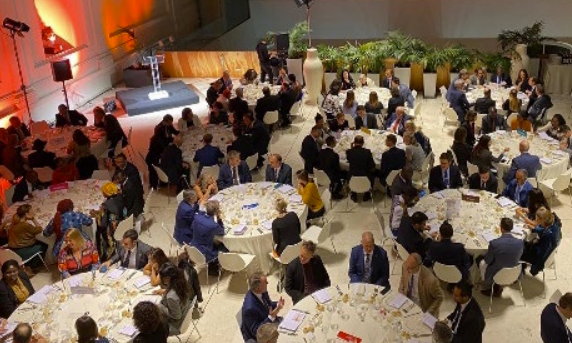
Ambassadors, representatives of CFS, member states, UN agencies, NGOs, and the private sector, built on the HLPE report and explored ways to emphasize resilience and inclusion across agrifood value chains to effectively support food systems transformation. The HLD showcased the potential for all food systems actors to work together to strengthen inclusion in our food systems and the need to respond to the multi-dimensional inequalities in food systems through informed and evidence-based policies for food security and nutrition security. It was identified throughout the discussions that addressing multidimensional inequalities and resilience in food systems required an approach with several key action areas:
- Commitments to diversity
- Coordinated interventions
- Coherence and Cooperation
- Innovation and data
- Finance and investment
Learn more about the outcomes from the HLD here.
Private Sector Leadership at the World Food Forum
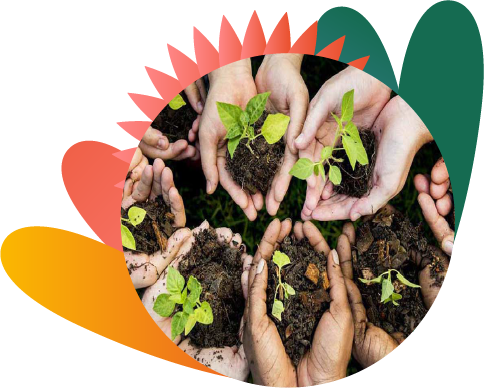
This year’s World Food Forum (WFF) attracted a PSM delegation of 92 delegates who participated in all three Forums across the week. Participation in WFF demonstrated the role the private sector plays in advancing youth in agri-food systems; science, innovation, and technology and the importance of investing in value chains to eliminate hunger and advance SGD2. Key highlights for the participation of PSM included 6 Bilateral meetings with FAO Directors, Member States, and International Finance Institutions. The PSM was well represented throughout the FAO Science and Innovation Forum (SIF) with 8 of our members acting as speakers or panellists during sessions. Additionally, PSM members held two separate Side Events in the Global Youth Forum, and participated in the Hand in Hand Investment Forum which provided constructive opportunities for members to discuss directing investments into countries and value chains that are of the highest priority for the FAO Hand-in-Hand initiative. Learn more about our engagement here.
November
Canadian Oats Take the Spotlight on World Diabetes Day
As part of our work to promote Canadian oats to Mexican consumers, Emerging worked on behalf of the Prairie Oat Growers Association, in collaboration with Mexican Diabetes Federation (FMD), to host a cooking workshop on November 21 through the Avena Canadiense Facebook page. The workshop celebrated World Diabetes Day and included presentations from nutritionists at FMD, as well as featured recipes from the 9th Avena Canadiense recipe contest. Recipes were adapted to be diabetes friendly, and a cooking demonstration highlighted 3 of the winning recipes. The Facebook Live event reached over 29,000 people and gathered over 25,000 views, a testament to the growing interest in oat nutrition for diverse diets.
Visualizing Blue Foods in Global Food Systems at COP28
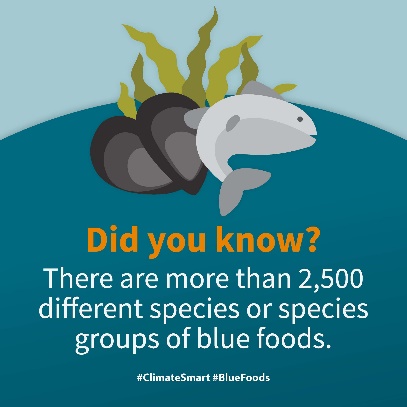
In collaboration with the Stanford Center for Ocean Solutions (SCOS), Emerging completed a design project focused on visualizing the impact of blue foods in global food systems and illustrating industry actors’ contributions to climate adaptation and mitigation. The project yielded an infographic, a series of social media visuals and a social media strategy tailored to jumpstart outreach to key stakeholders and policy leaders, as well as a print-ready brochure for distribution at COP28. For a detailed look at the finalized infographic and visuals, please find this here and follow SCOS on X, Facebook and LinkedIn to see the visuals in action.
Highlights from the DSI Scientific Network’s CPHIA 2023 Side Event
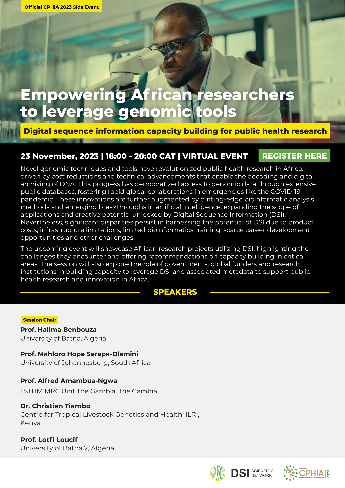
On November 23, 2023, the DSI Scientific Network, coordinated by Emerging as the Secretariat, successfully organized an online side event, “Empowering African researchers to leverage genomic tools: Digital sequence information (DSI) capacity building for public health research.” Aligned with the third International Conference on Public Health in Africa (CPHIA 2023), the event showcased pioneering DSI-based research projects in Africa, addressing challenges faced by researchers and offering recommendations for capacity building.
As part of its efforts to raise awareness of the importance of DSI open access and benefit-sharing, the Network published two policy briefs – “Harmonization of benefit sharing systems for DSI” and “Geographical Origin Information for DSI Benefit Sharing”. Members also released three impactful case studies this year, spotlighting the applications of DSI in addressing pressing issues: COVID-19 pandemic, Chytridiomycosis (linked to amphibian extinctions), and the Ebola virus. These endeavors collectively marked a significant stride in advancing research and innovation for addressing global health and conservation challenges in Africa and worldwide.
African Conference on Agricultural Technologies (ACAT)
The inaugural African Conference on Agricultural Technologies (ACAT), hosted by the Africa Agricultural Technology Foundation (AATF), was a successful groundbreaking event, that happened on October 30th to November 3rd, 2023, in Nairobi, Kenya. Themed “Agricultural Resilience through Innovation,” the event aimed to showcase the pivotal role of science, technology, and innovation (STI) in propelling agricultural transformation across the African continent. The conference was a bold step towards a more efficient, inclusive, resilient, and sustainable future for African agriculture.
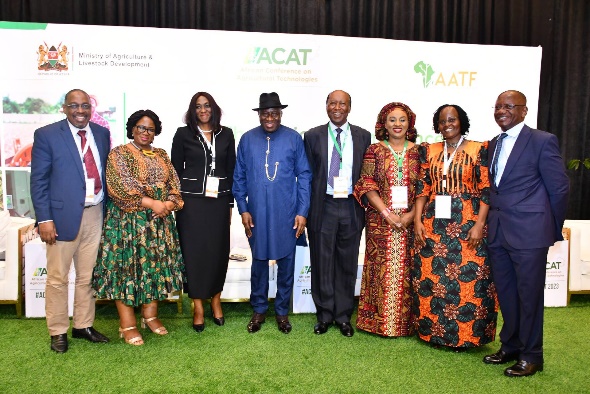
Emerging worked on the program, content and speaker management for the conference, resulting in:
- 10+ live demonstrations of cutting-edge technologies in the agri-food sector
- 500+ participants from various sectors
- 150+ speaking slots for experts, researchers, and industry leaders
- 8 plenary sessions addressing key themes in agricultural innovation
- 6 Technical interactive panels facilitating in-depth discussions on topics such as mechanisation, Agtech and Digital, Urban and Peri Urban agriculture etc…
- 7 strategic dialogues allowing major groups to elaborate on the future of agricultural technologies in the continent.
December
World Soil Day at #COP28
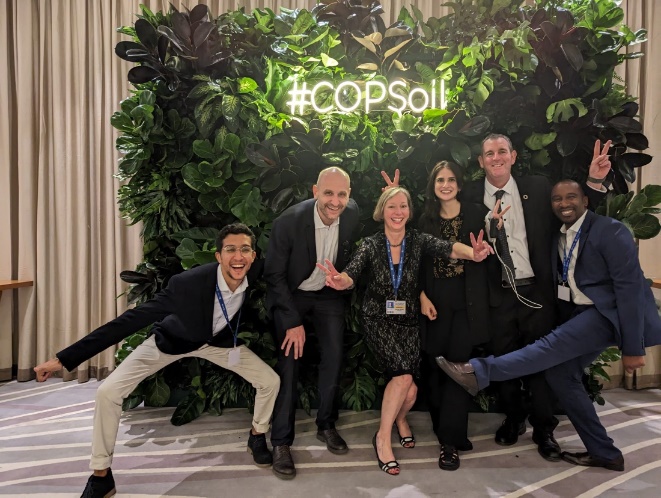
World Soil Day was celebrated December 5 and highlighted the unsung hero beneath our feet—soil. This day served as a reminder of the importance of sustainable soil management to ensure food security, biodiversity conservation, and climate change mitigation. In light of this, and against the backdrop of UNFCCC COP28, the Coalition of Action 4 Soil Health (CA4SH) hosted a special dinner on December 5 in Dubai. The event put a spotlight on the indispensable role that soils play in carbon sequestration and climate management. With the global demand for land escalating due to climate change and a burgeoning population, the dinner emphasized the urgent need to overhaul existing land management practices.
Bringing together leaders from the private sector, UN organizations, farmers, NGOs, and civil society, the dinner served as a dynamic forum to explore innovative solutions for integrated soil, plant, and land fertility management. This dinner was not just a feast for the senses but a call to action, and a celebration of the inclusion of soil health in the Emirati Declaration – a significant achievement to have 152 countries recognize soil health.
Learn more about the even through CA4SH’s social channels on LinkedIn and X.
Agricultural Sustainability and Climate Resilience at COP28
The 28th Conference of the Parties on Climate Change (COP28), in Dubai from November 30 to December 12, 2023, marked a significant milestone in integrating agriculture and food systems into the global climate dialogue. The event featured over 600 agriculture-related sessions, including more than 125 dedicated to Food, Agriculture, and Water Day.
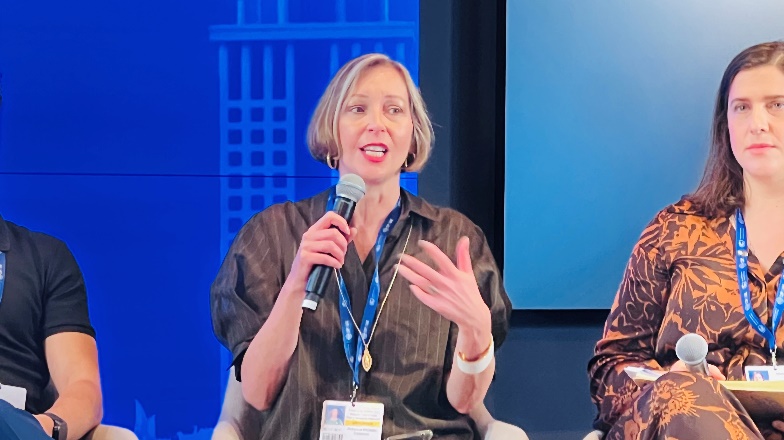
The Emirati Declaration, supported by 152 countries, highlighted a collective commitment to sustainable agricultural practices and resilience. Official UNFCCC agricultural negotiations encountered challenges, notably in establishing a Coordination Group as part of the discussion on the work plan for Sharm el Sheik Joint Work until 2026.
The Food and Agriculture Organization (FAO) launched a roadmap aimed at achieving CO2-neutral agrifood systems by 2035 and promoting universal healthy diets by 2050, aligning with the 1.5°C Paris Agreement goal. Emerging played an instrumental role in assisting partners move forward momentum to unlock more ambitious climate action during COP28. Emerging’s active engagement efforts at COP28 contributed to advancing cross-sectoral climate action dialogues, including commitments on soil health, regenerative agriculture and methane reduction.
Learn more about COP28 activities here.
COP28 Elevates Agri-Food Systems on the Climate Agenda
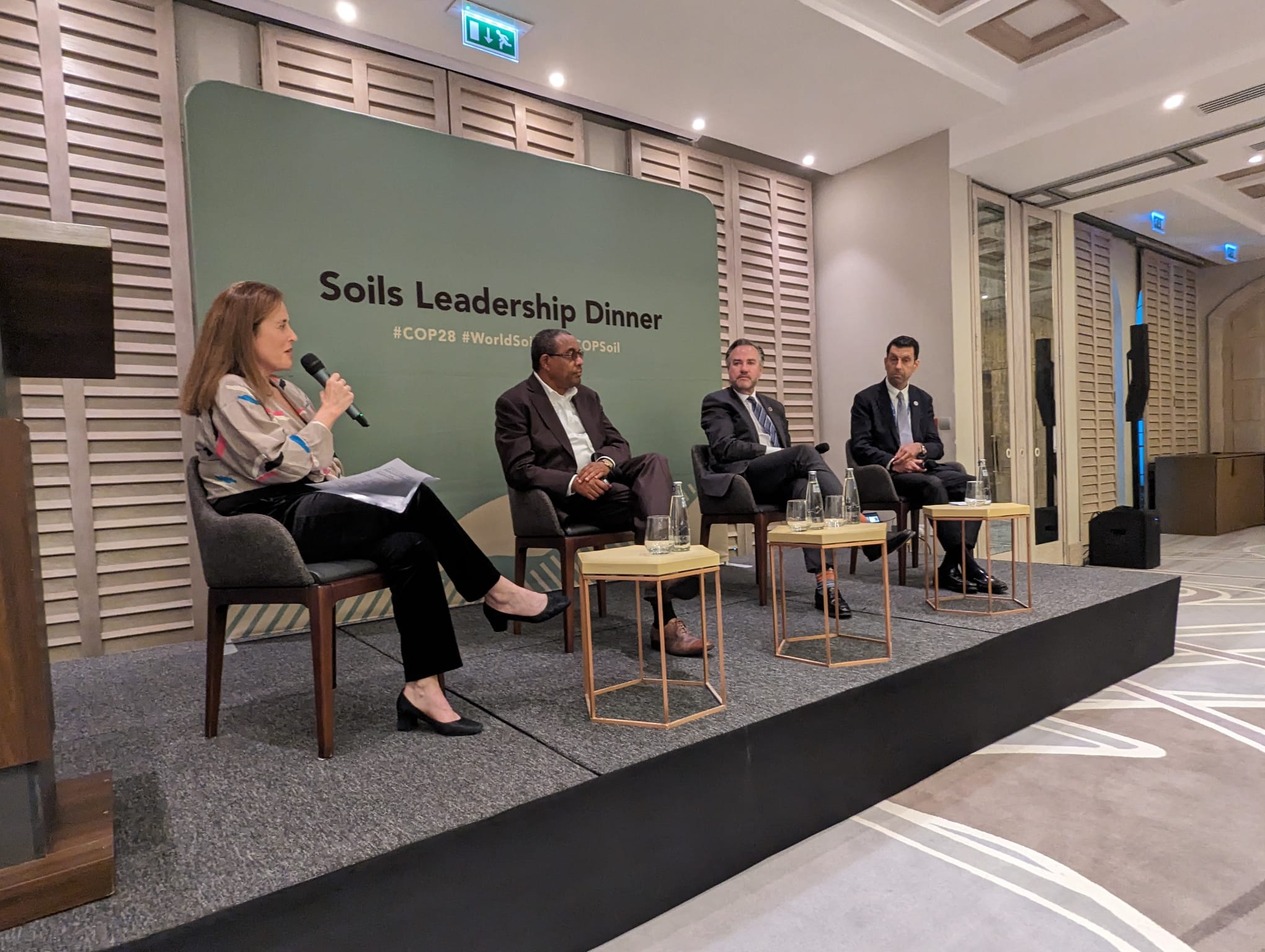
For many years, I attended COP meetings in which agri-food systems were not at, or on, the table. This year, the UAE captured a new political will to put food and agriculture firmly in the climate discussions and secured unprecedented support. The Emirates Declaration on Sustainable Agriculture, Resilient Food Systems, and Climate Action, backed by an impressive 159 countries, reflects a collective commitment to sustainable agricultural practices and resilient food systems. In particular, the leadership of H.E. Mariam Bint Mohammed Saeed Hareb Almheiri managed to have countries commit to include agriculture and food systems in their Nationally Determined Contributions (NDCs). This takes the climate change and agri-food discussion back to the national level, where regulation, incentives and measurement are not abstract, but rather very concrete – truly a game changer.
On a personal note, I am also pleased that the Declaration included a reference to soil health, and important breakthrough in getting soils on the agenda in the climate discussion. The announcements on regenerative landscapes furthered this commitment to soils and nature-based solutions.
Throughout the week there were also major announcements on finance, particularly for innovation. CGIAR secured an impressive US$890 million to assist smallholder farmers in low- and middle-income countries, with substantial contributions from the Netherlands, the UK, the US, the World Bank, and Norway. Initiatives like the AIM4Climate Initiative increased its investment to over $17 billion, aiming to reduce farming emissions. There were many other announcements as well, but one area that needs attention is Loss and Damage funding. It was the first announcement of COP that a Loss and Damage fund was set up – a success for UAE, since there had been a lot of foot dragging in this area. Though established with a paltry sum, it is important agriculture is identified early as a potential beneficiary since farmers in rural areas are on the front lines of climate damage. We need proactive funding to protect against drought, flooding, and herd loss that leads to food insecurity and a continued cycle of degraded landscapes.
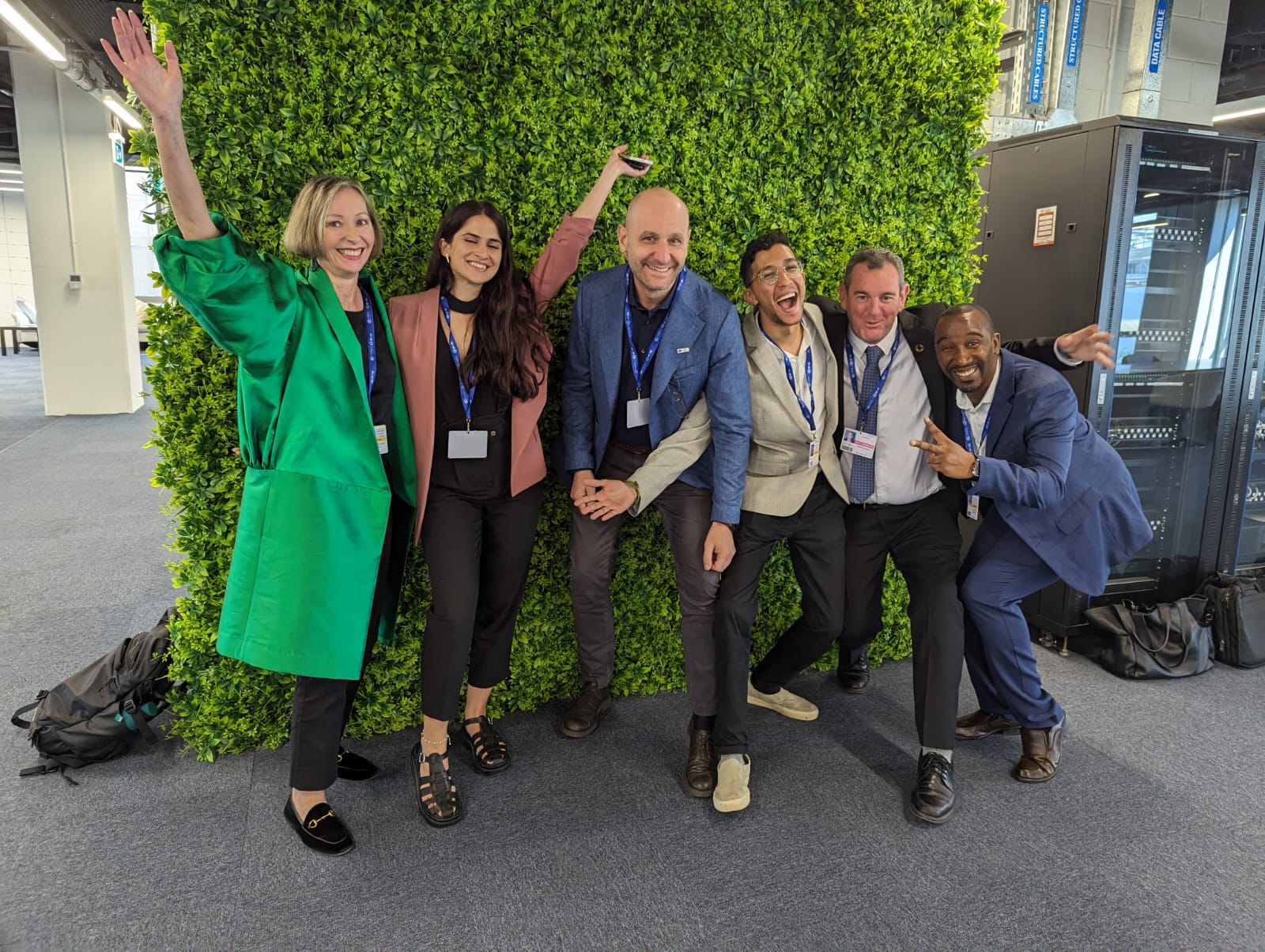
FAO was active with several released reports, including the “FAO Roadmap to SDG2 without breaching the 1.5C threshold“, to attain SDG2 on Zero Hunger without exceeding the 1.5°C global warming goal. The Roadmap, presented with a global vision, aims to develop regional plans and financial assessments by COP29 and country-specific action plans, monitoring, and accountability mechanisms by COP30. Focused on ten key action domains, the Roadmap outlines goals such as achieving CO2-neutral agrifood systems by 2035, transforming them into a net carbon sink (-1.5 Gt CO2eq/year) by 2050.
We also saw the milestone decision on the First Global Stocktake (GST), offering an initial assessment of global progress towards the Paris Agreement’s goals. Agriculture and food systems were featured in the adaptation section of the GST emphasizing the pivotal role that food systems should play in climate adaptation. The GGA also included reference to agriculture and food systems, signalling a new willingness to incorporate the sector into overarching outcomes of the COP negotiations. Sadly, this did not extend to the one specific, technical area of negotiation on agri-food.
The Sharm El Sheikh Joint Work on the Implementation of Climate Action on Agriculture and Food Security and no substantial outcome was reached. This makes the discussion in Bonn in June 2024 very important to see if the political will at #COP28 translates into technical work.
COP28 marked a significant step forward in integrating agriculture and food systems into the global climate dialogue. More than 600 events were dedicated to agriculture, with a focus on Food, Agriculture, and Water Day (December 10th) hosting over 125 events on Food and Agriculture. It was exciting, but I hope that proliferation can be contained next year so that the sector spends less time speaking to itself in small events, and expands to engage in discussions across the COP process. Looking ahead to COP29 in Baku, Azerbaijan and COP30 in Belem, Brazil, food systems will clearly be a priority topic and the entire food system, including farmers, will need to adjust from the days when we were left out to being at the centre table. Let’s continue to focus on the solutions agriculture can bring on climate change and the means to implement them as quickly as possible.
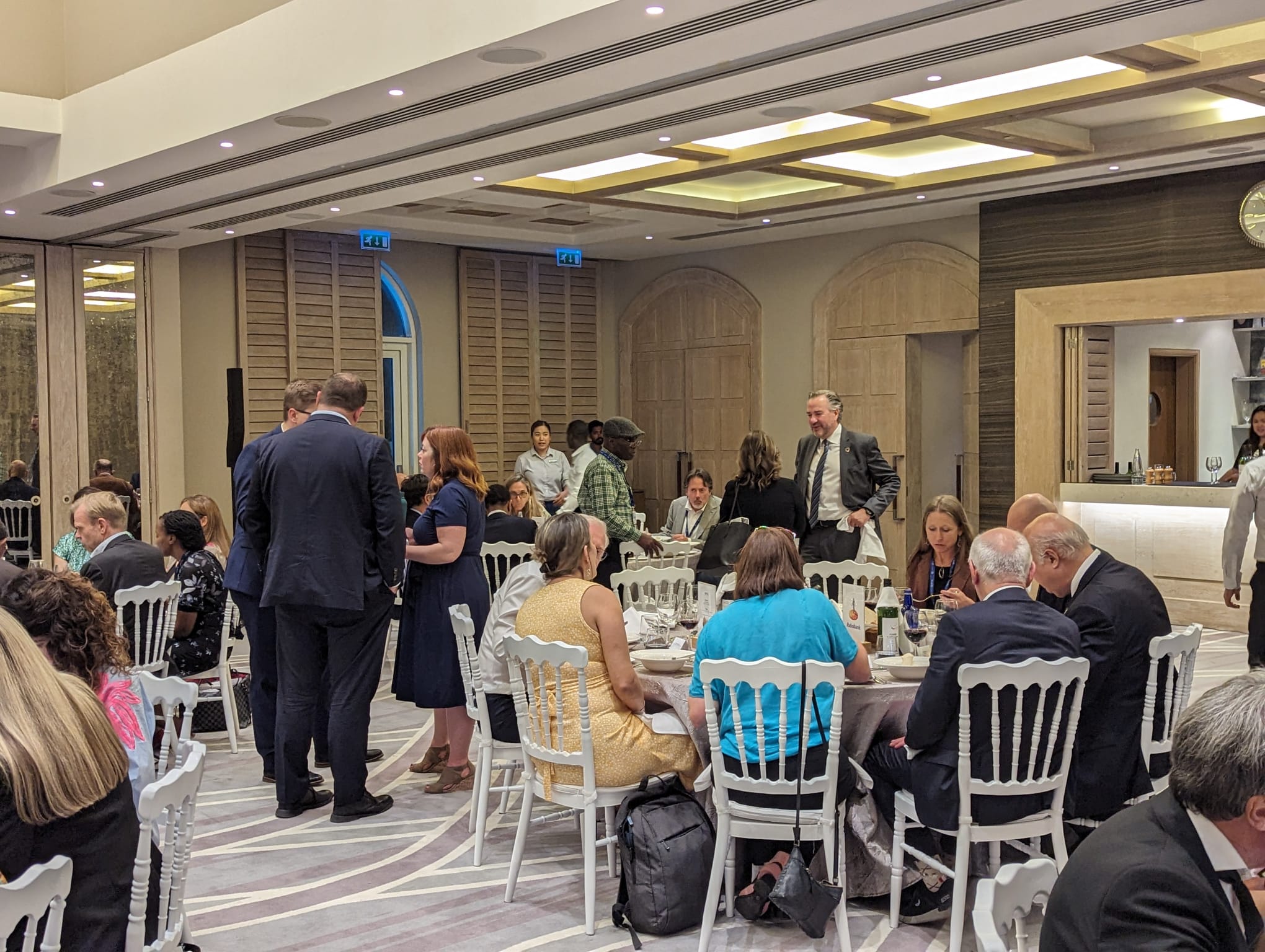
For some holiday reading, learn more about some of the components:
- To support that, the Alliance for Champions of Food Systems Transformation: Brazil, Cambodia, Norway, Rwanda, and Sierra Leone, backed by non-state actors like WWF, CGIAR, Bezos Earth Fund, and WRI, is committed to driving systemic food system changes and inspiring other countries.
- The COP28 Food, Agriculture, and Climate Action Toolkit, supported by the UAE Presidency, provides resources for integrating food into Nationally Determined Contributions and National Adaptation Plans.
- The FAO’s FAST initiative, developed as a multi-stakeholder partnership program, will support the implementation of the Emirates declaration.
- The UAE Presidency of COP28, WBCSD, and BCG, backed by UN Climate Change High-Level Champions, launched the Action Agenda on Regenerative Landscapes to scale regenerative agriculture across 160 million hectares by 2030, with USD$2.2 billion in investment and engaging 3.6 million farmers globally.
- At the very start of COP28, the operationalization of the Loss and Damage Fund marked a crucial step in climate finance, receiving commitments from various countries, including the UAE, Germany, the UK, Japan, the U.S.A and others.
- Sharm el-Sheik Joint Work Program, the legacy initiative of the Koronivia work, adopted procedural conclusions (FCCC/SB/2023/L.8)
- The Global Stocktake Decision & the Global Goal on Adaptation Decision
